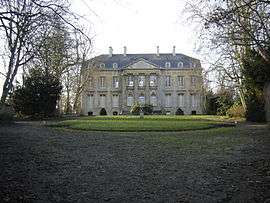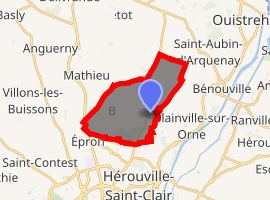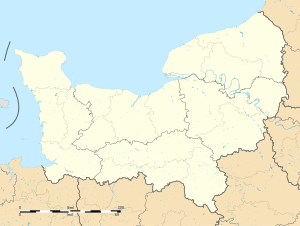Biéville-Beuville
Biéville-Beuville is a commune in the Calvados department in the Normandy region in northwestern France. The hyphenated name originates from the parishes of Biéville-sur-Orne and Beuville, which were united in the 1970s.
Biéville-Beuville | |
|---|---|
 Chateau of Biéville | |
Location of Biéville-Beuville 
| |
 Biéville-Beuville  Biéville-Beuville | |
| Coordinates: 49°14′11″N 0°19′33″W | |
| Country | France |
| Region | Normandy |
| Department | Calvados |
| Arrondissement | Caen |
| Canton | Ouistreham |
| Intercommunality | Caen la Mer |
| Government | |
| • Mayor (2014–2020) | Dominique Vinot-Battistoni |
| Area 1 | 11.15 km2 (4.31 sq mi) |
| Population (2017-01-01)[1] | 3,391 |
| • Density | 300/km2 (790/sq mi) |
| Demonym(s) | Boevillais |
| Time zone | UTC+01:00 (CET) |
| • Summer (DST) | UTC+02:00 (CEST) |
| INSEE/Postal code | 14068 /14112 |
| Elevation | 1–58 m (3.3–190.3 ft) (avg. 30 m or 98 ft) |
| 1 French Land Register data, which excludes lakes, ponds, glaciers > 1 km2 (0.386 sq mi or 247 acres) and river estuaries. | |
Toponymy
The name Biéville is believed to come from the Old German name Boio[2] or Boia[3] combined with the Old French ville, meaning farm. Biéville was recorded as Boiavilla in 1082.[4] Residents (of the combined town) are still known as Boevillais.
Similarly, Beuville is believed to come from the Old German name Bodo. It was recorded as Bodvilla in 1134.[2][3]
Norman settlers from the area in Scotland and England carried surnames such as de Bouvelles, de Bovelles, de Boyuille and de Boyuill, and are believed to be the origin of the common surnames Boyle and Bowles.[5]
History
Until the middle of the 16th century, the seignory of Beuville remained in the hands of the de Beuville family. In 1770, it fell to the Lecocq family; Louis Lecocq was the last lord of Beuville before the French Revolution overthrew the nobility.[6]
The lordship of Bieville was a fiefferme (a fiefdom owned by the crown but leased to a local lord). The lords of Biéville were less powerful than the lords of other seignories such as Beuville, as their lands were not centralized. The lords of Biéville operated several other significant estates, including Rubercy, la Vallée, Balleroy, and la Londe.
During the Second World War, the British fought the Germans for more than a month nearby. The two parishes were united to form one commune in 1972.[7]
Population
| Historical population | ||
|---|---|---|
| Year | Pop. | ±% |
| 1793 | 799 | — |
| 1800 | 811 | +1.5% |
| 1806 | 853 | +5.2% |
| 1821 | 857 | +0.5% |
| 1831 | 857 | +0.0% |
| 1836 | 827 | −3.5% |
| 1841 | 851 | +2.9% |
| 1846 | 883 | +3.8% |
| 1851 | 884 | +0.1% |
| 1856 | 879 | −0.6% |
| 1861 | 875 | −0.5% |
| 1866 | 797 | −8.9% |
| 1872 | 781 | −2.0% |
| 1876 | 779 | −0.3% |
| 1881 | 715 | −8.2% |
| 1886 | 639 | −10.6% |
| 1891 | 657 | +2.8% |
| 1896 | 568 | −13.5% |
| 1901 | 567 | −0.2% |
| 1906 | 562 | −0.9% |
| 1911 | 553 | −1.6% |
| 1921 | 586 | +6.0% |
| 1926 | 579 | −1.2% |
| 1931 | 571 | −1.4% |
| 1936 | 578 | +1.2% |
| 1946 | 639 | +10.6% |
| 1954 | 713 | +11.6% |
| 1962 | 810 | +13.6% |
| 1968 | 1,117 | +37.9% |
| 1975 | 1,321 | +18.3% |
| 1982 | 1,606 | +21.6% |
| 1990 | 2,223 | +38.4% |
| 1999 | 2,191 | −1.4% |
| 2008 | 2,525 | +15.2% |
See also
References
- "Populations légales 2017". INSEE. Retrieved 6 January 2020.
- Dauzat, Albert; Rostaing, Charles (1963). Larousse (ed.). Dictionnaire étymologique des noms de lieux en France. Paris.
- Lepelley, René (1996). Charles Corlet (ed.). Dictionnaire étymologique des noms de communes de Normandie (in French). Condé-sur-Noireau. p. 68.
- Bourrienne, V. (1895). Malherbe: points obscure et nouveaux de sa vie normande (in French). A. Picard et fils. p. 140. Retrieved 27 June 2017.
- Hanks, Patrick; Coates, Richard; McClure, Peter (2016). The Oxford Dictionary of Family Names in Britain and Ireland. Oxford University Press. p. 298. ISBN 9780192527479. Retrieved 27 June 2017.
- "La commune et son histoire" (in French). Commune de Biéville-Beuville. Retrieved 27 June 2017.
- "La mémoire des pierres" (in French). Commune de Biéville-Beuville aux portes de Caen Calvados Normandie. 15 January 2016.